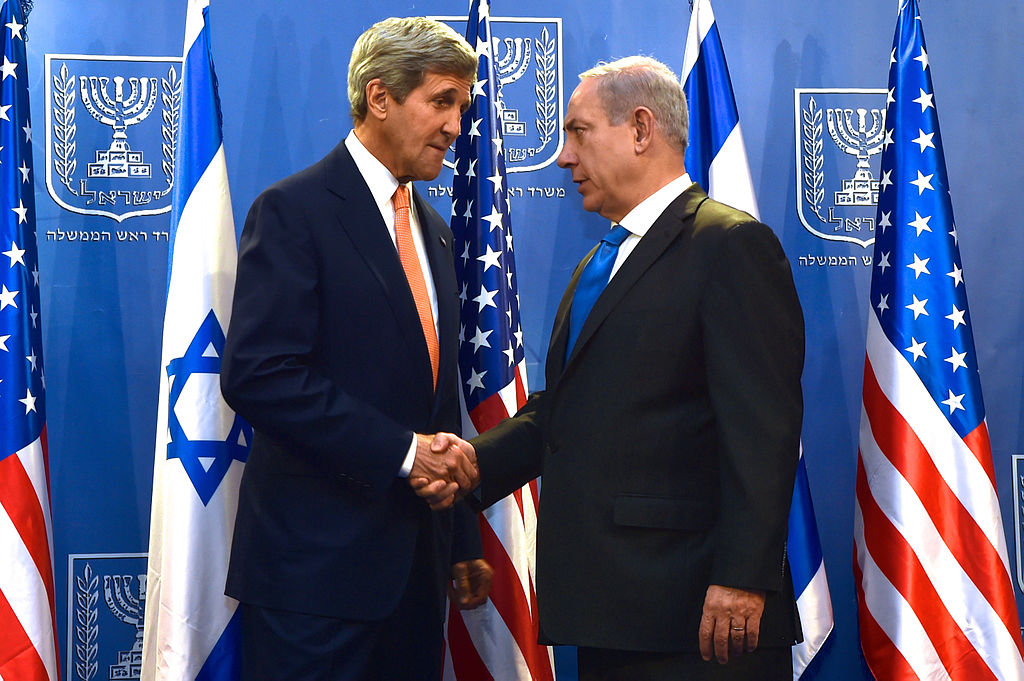Why do people cling so passionately to political opinions, even when a preponderance of facts suggests their views might be wrong or incomplete? To the social psychologist Jonathan Haidt, author of The Righteous Mind (2012), the arguments and narratives we present in defense of our positions are, in fact, “mostly post-hoc constructions made up on the fly, crafted to advance one or more strategic objectives.” As such, those constructions are often impervious to new information or alternative narratives. “Intuitions come first,” Haidt writes; “strategic reasoning second.”
So far as I know, Prime Minister Benjamin Netanyahu and Defense Minister Moshe Yaalon do not have any special training in the fields of psychology or social theory. Yet these two politicians, who stand at the apex of Israel’s foreign and defense establishment, seem to have internalized Haidt’s conclusions years ago. Having done so, both have regarded with equanimity—some would say with disdain—the cacophony of righteous indignation and overweening certainty with which many pundits at home and abroad pronounce the coming fall of the Jewish state, the irreversible alienation of American Jewry, and the steady collapse of Israeli democracy.
In conversations with diplomats and journalists from abroad, someone in my business quickly learns how unassailable these narratives have become. It isn’t just that they are accepted universally and completely; they are accepted by many who lack the means or the will to summon the knowledge necessary to support such sweeping assurances.
How, then, are we to assess these prevailing theologies, which drive so much of the world’s perception of the Israeli-Palestinian conflict? According to researchers like Haidt who study the human mind, all of us are at least partly lying our way through our politics. Should we then treat these warnings, however unexamined, with at least enough humility to consider whether they might be at least partly true?
Enter Elliott Abrams. In his essay in Mosaic, Abrams tackles one of the key unexamined truths upheld by the Israeli-Palestinian commentariat: the vague, dire warning that the current state of the conflict is “unsustainable.”
Abrams does two things very well. First, he lays out a comprehensive, reasoned case, founded on well-known facts and recent events, that the current Israeli-Palestinian status quo might be the least dangerous of the many bad outcomes currently available to Israeli and Western policy makers. Second, in making this case he effectively invites us to weigh a startling question: given the woeful results of Israel’s withdrawals from southern Lebanon and Gaza, the dysfunction and instability that characterize Palestinian politics even at its most moderate, the looming dangers from IS and Iran, which together inspire, fund, train, and/or direct most of the terror organizations already operating under Palestinian authority, why do people still cling so thoughtlessly to the “unsustainability” argument?
One example. We often hear that Israel is running out of time demographically; that West Bank Palestinians will soon demand Israeli citizenship; and that, if it grants citizenship, Israel will quickly lose its Jewish majority, and thus its raison d’être as the nation-state of the Jews, while if it denies citizenship it will transform itself once and for all into a thoroughly apartheid state.
But is it reasonable to expect events to develop like that, and so rapidly? One of the few things about which most Israelis and Palestinians seem to agree is that neither party wants to live with the other; nor have West Bank Palestinians shown any desire for Israeli citizenship. If, at some future time, a large enough number of Palestinians were to make such a demand, Israel would indeed be faced with choices: grant citizenship, withdraw from the West Bank and recognize a full-fledged Palestinian state, or reject the request pending some other resolution. But where is the evidence that any such moment of decision is nigh, or that if events do reach this point Israel will have lost the option of unilateral withdrawal, or, more pointedly, that it would be safer or wiser to make the decision now, before the necessity arises?
Whether, on moral grounds, one supports or opposes a speedy Israeli withdrawal from the West Bank is not the issue; what fails to withstand scrutiny is the demographic justification for such a withdrawal.
Meanwhile, the dangers of withdrawal are harder to brush away. The dysfunctional political elite of the Palestinian Authority shows no signs of being able to reciprocate Israel’s surrender of control in the West Bank with any guarantees, or even reasonable expectations, of becoming a stable, peaceful polity next door to the Israeli heartland. What is more, after the outcomes of the withdrawals from southern Lebanon (2000) and Gaza (2005), simply arguing that the status quo is unsafe without explaining why it is more unsafe than staying put seems, well, not serious.
Pundits who actually want to see a withdrawal implemented in their lifetime cannot afford to ignore the clear-cut, precedent-rich threats that Israelis worry about in favor of unconvincing tropes that transparently fail to take into account the most basic facts of the conflict. Israelis need to be convinced not that disengaging from the Palestinians is a good idea, but simply that it is a safe one. This is a harder case to make, but it would have the considerable merit of addressing the actual obstacles to withdrawal.
All of which brings us back to Netanyahu and Yaalon’s resistance to the prevailing narratives about “the conflict,” and to Elliott Abrams’ essay.
Quietly, unhurriedly, the two Israeli leaders are putting in place a profound change in policy toward the Palestinians. In a little-noticed comment at a press conference in mid-July, Netanyahu delivered, almost off-hand, the outlines of that new policy. The first Israeli journalist to notice or grasp the significance of these comments was David Horovitz, the editor of the Times of Israel (and my boss), who wrote:
The prime minister spoke his mind as rarely, if ever, before. . . . He made explicitly clear that he could never, ever, countenance a fully sovereign Palestinian state in the West Bank. . . . Why? Because, given the march of Islamic extremism across the Middle East, he said, Israel simply cannot afford to give up control over the territory immediately to its east, including the eastern border—that is, the border between Israel and Jordan, and the West Bank and Jordan. . . . Amid the current conflict, he said, “I think the Israeli people understand now what I always say: that there cannot be a situation, under any agreement, in which we relinquish security control of the territory west of the River Jordan.”
What will all of this mean? As Horovitz notes:
Not relinquishing security control west of the Jordan . . . means not giving a Palestinian entity full sovereignty there. It means not acceding to Mahmoud Abbas’s demands, to Barack Obama’s demands, to the international community’s demands. This is not merely demanding a demilitarized Palestine; it is insisting upon ongoing Israeli security oversight inside and at the borders of the West Bank. That sentence, quite simply, spells the end to the notion of Netanyahu consenting to the establishment of a Palestinian state. . . . He wasn’t saying that he doesn’t support a two-state solution. He was saying that it’s impossible.
Separately, about a month after Netanyahu’s comments, one thoughtful observer of the conflict put it to me this way (I’m paraphrasing): Israel still has a two-state policy, but in practice it’s a “let’s not let the West Bank turn into Gaza” policy. The two may not be mutually exclusive in theory, but they are almost certainly mutually exclusive in practice.
And the reason is clear. The version of statehood suggested by Netanyahu does not address fundamental Palestinian aspirations. For the Palestinians, the aim of statehood is not about institution-building, as Europeans and Americans tend to see it, but about the need to address the indignities and dispossession of the Palestinian past, the paramountcy of the naqba in Palestinian cultural identity. To be sure, it is not clear that this need can ever be satisfied; Palestinian demands in the past do not bode well in that regard. But Netanyahu’s new maximum will certainly not end the conflict, and lies far below even the American and European minimum.
Abrams, in short, has zeroed in on the question that is driving the most significant change in Israeli security policy in a generation. Netanyahu, too, is asking precisely the same question, and has reached conclusions not dissimilar to Abrams’.
And there’s the rub. If much of the punditry on the Israeli-Palestinian conflict suffers from a distressing lack of intellectual seriousness, there is a profound reason for that. These interminably repeated truisms are not really meant to be heard as policy prescriptions, but rather as moral assertions.
In debates in which I’ve participated over the years, more than a few critics of Israel, pushed to the wall by facts like those presented by Abrams, have switched effortlessly from arguing that Israel cannot allow the continuation of the status quo to insisting that it must not: a moral imperative that justifies accepting whatever manifest dangers are inherent in an IDF withdrawal from the West Bank. Since the moral balance so overwhelmingly favors withdrawal, there is hardly any need to explain how it might be carried out safely. Those advocating it are acting as Israel’s moral conscience—whereas I, in challenging their assertions, can have no other motive but the perpetuation of a monstrous immorality.
One can decline to take this discourse seriously, as Netanyahu, Yaalon, Abrams, and others do. It is indeed shrill, ignorant, and unresponsive to evidence or events. But it is no less politically potent for that. For many in the troubled Arab world, the Palestinians’ weakness is a stand-in for their own sense of civilizational vulnerability and failure, while Israeli power highlights their galling helplessness in a world that is quickly leaving them behind. For many millions of others, including Europeans and North Americans, the simple sense of a vast disparity in power and economic wellbeing between Israelis and Palestinians tilts the moral scales definitively. The strong, they feel, can afford to lose far more than the weak.
Over the past two decades, Israel’s supporters around the world have been able to counter such assertions with a powerful rejoinder, which goes something like this: “You’re right. The moral calculus favors Palestinian independence. But Israel, in fact, agrees with you. Israel wants peace. It has withdrawn from territory in the past in exchange for peace, and is negotiating to do so again in the future. The problem comes from the other side. As soon as the Palestinians show their willingness for real peace, they’ll find Israel only too ready to accommodate.”
But now it may be growing harder to say this. In the words of an influential Israeli speaking recently in a closed forum, “the work that the aspiration for a two-state solution does for Israel’s capacity to conduct itself internationally is huge. That activity enables us to function internationally. If hope is gone, if we cannot show this aspiration, it will be much harder to function. Israel will essentially be asking its liberal allies to come to terms with indefinite occupation.”
Ironically, such a change is likely to go over more easily in the Middle East than in Europe or America. Considering the looming threat of IS, the bloodbaths in Syria and Libya, or the political turmoil in Egypt, Libya, Lebanon, and the Gulf, Israel’s desire to cling to the status quo seems perfectly intelligible to its near neighbors. Even some Palestinians, observing al-Nusra’s approach to the Golan border and the Islamic State’s flirtation with the Jordanian frontier, whisper their assent. In terms of concrete regional alternatives, there is an important upside to the idea that the full might of the IDF will continue to stand between Palestinian cities and the ravaging Islamist hordes without.
Internationally, however, these considerations do not appear to factor into the moral sensibilities or political narratives of diplomats, journalists, activists and leaders. And so, here is a danger to counterbalance Abrams’ carefully constructed policy equation. It is not Israel’s enemies who will be repelled by a de-facto decision to cease seeking a two-state solution, but its most important friends. For these friends, it is one thing to struggle and fail to achieve peace, quite another to renounce the struggle altogether.
Of course, Netanyahu’s own statements, and the positions he took in the last round of peace talks, are far more nuanced than this. He has essentially mapped out what he is willing to offer the Palestinian national movement now, under current circumstances, while tacitly acknowledging that circumstances can change, and new governments will react to those new circumstances. In the meantime, the Palestinians would enjoy far greater independence and autonomy than they do now, in addition to the security benefits of being behind the Israeli defensive line. And they would gain formal recognition from Israel of their statehood, a dramatic move forward in diplomatic terms.
But such nuances do not really mitigate the troubling possibility that the tacit shelving of the two-state solution, however temporary, would be widely seen as proving Israel’s worst detractors correct. Netanyahu cannot be trusted, Barack Obama once said, a little too close to a microphone. That was when Netanyahu was on record in support of the two-state solution. “What Now for Israel?” Abrams’ title asks. What now indeed, when Israel’s supporters won’t even be able to point to an Israeli declaration of intent?
______________
Haviv Rettig Gur is the political correspondent of the Times of Israel.








